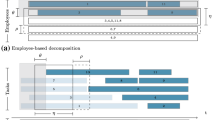Abstract
A common problem in production planning is to sequence a series of tasks so as to meet demand while satisfying operational constraints. This problem can be challenging to solve in its own right. It becomes even more challenging when higher-level decisions are also taken into account, such as which shifts should be selected to accommodate production. In this paper, we introduce the Shift-Selection and Task Sequencing (SS-TS) problem, develop the hybrid Test-and-Prune algorithm (T&P) to solve SS-TS, and present computational experiments based on a real-world problem in automotive stamping to demonstrate its effectiveness. In particular, we are able to solve, in very short run times, a number of problem instances that could not be solved through traditional integer programming methods.
Preview
Unable to display preview. Download preview PDF.
Similar content being viewed by others
References
Armacost, A., Barnhart, C., Ware, K.: Composite Variable Formulations for Express Shipment Service Network Design. Transportation Science 36, 1–20 (2002)
Barlatt, A., Cohn, A., Guisikin, O., Fradin, Y., Morford, C.: Using Composite Variable Modeling to Achieve Realism and Tractability in Production Planning: An Example from Automotive Stamping. Technical Report TR07-01 (2007), http://ioe.engin.umich.edu/techrprt/pdf/TR07-01.pdf
Bernstein, D., Rodeh, M., Gertner, I.: On the Complexity of Scheduling Problems for Parallel/Pipelined Machines. IEEE Transactions on Computers 39, 1308–1313 (1989)
Blazewicz, J., Lenstra, J., Rinnooy Kan, A.: Scheduling Subject to Resource Constraints: Classification and Complexity. Discrete Applied Mathematics 5, 11–24 (1983)
Gabbay, H.: Multi-Stage Production Planning. Management Science 25, 1138–1148 (1979)
Garey, M., Johnson, D., Sethi, R.: The Complexity of Flowshop and Jobshop Scheduling. Mathematics of Operations Research 1, 117–129 (1976)
Klose, A.: An LP-Based Heuristic for Two-Stage Capacitated Facility Location Problems. The Journal of the Operational Research Society 50, 157–166 (1999)
Monma, C., Potts, C.: On the Complexity of Scheduling with Batch Setup Times. Operations Research 37, 798–804 (1989)
Potts, C., Kovalyov, M.: Scheduling with Batching: A Review. European Journal of Operational Research 120, 228–249 (2000)
Qiu, M.M., Burch, E.E.: Hierarchical Production Planning and Scheduling in a Multi-Product, Multi-Machine Environment. International Journal of Production Research 35, 3023–3042 (1997)
Author information
Authors and Affiliations
Editor information
Rights and permissions
Copyright information
© 2008 Springer-Verlag Berlin Heidelberg
About this paper
Cite this paper
Barlatt, A., Cohn, A.M., Gusikhin, O. (2008). A Hybrid Approach for Solving Shift-Selection and Task-Sequencing Problems. In: Perron, L., Trick, M.A. (eds) Integration of AI and OR Techniques in Constraint Programming for Combinatorial Optimization Problems. CPAIOR 2008. Lecture Notes in Computer Science, vol 5015. Springer, Berlin, Heidelberg. https://doi.org/10.1007/978-3-540-68155-7_24
Download citation
DOI: https://doi.org/10.1007/978-3-540-68155-7_24
Publisher Name: Springer, Berlin, Heidelberg
Print ISBN: 978-3-540-68154-0
Online ISBN: 978-3-540-68155-7
eBook Packages: Computer ScienceComputer Science (R0)




